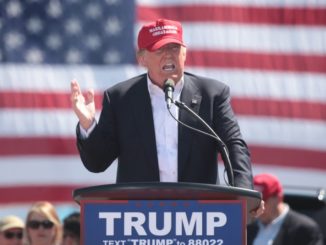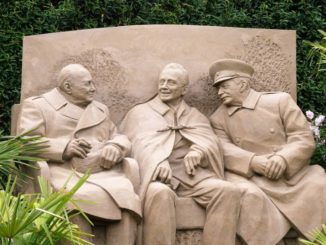
See page for author, Public domain, via Wikimedia Commons
I suspect that all Puffins are fervently hoping that the US Presidential Election will result in the return of the Donald to the White House. If this happens, it will be an unusual but not unique achievement and I thought I would write about the only other time a US President was elected for two non-consecutive terms- Grover Cleveland, the 22nd and 24th President of the United States.
US politics , like British politics , has two parties vying for power but with periods where one party has generally the upper hand. Here we can say that the Conservatives dominated between 1922 and 1997. In the US, the Republican Party enjoyed a similar period from Lincoln’s election in 1860 until FDR took power at the start of 1933 and kept the Democrats in office for twenty years. Ever since it has been remarkably “even steven.” Cleveland , like Harold Wilson perhaps, was a rare Democratic party success in a generally unsuccessful era.
Stephen Grover Cleveland (always known by his second Christian name) was born in New Jersey in 1837 of “old American” stock. His grandfather was a veteran of Washington’s army and had fought at Bunker Hill during the Revolution. His father was described as an “itinerant Presbyterian Minister” which I take to mean that his Church (much like the present UK Methodist Church) required its clergy to change Church every few years rather than to put down roots in a particular parish for many years. His father died young leaving Cleveland to leave school in his middle teens to seek work as a clerk in a law firm in Buffalo , New York State, to support his family but where his talent led him to qualify for the New York State Bar (each state to this day has its own system of courts and lawyers) at the early age of 22.
The civil war broke out, perhaps the most defining period in American history, the year after he qualified. Cleveland was eligible for the draft to Lincoln’s Federal army . He did not serve. A peculiarity of that period was that a draft required someone to provide a soldier. The poor had to serve themselves. The rich could provide a “substitute” who was paid by the draftee to serve in his place and thus a 32 year old Polish immigrant named George Bennenski took Cleveland’s place. Bennenski survived the War. This system was not unique to the US. Pre 1870 France took it to another level. Their peace time draft was decided by lottery and drawing a “mauvais numero” was shattering bad luck as it entailed service in the army for seven years. Not only could the wealthy hire substitutes but being drafted was an insurable risk so that a wealthy family could pay a premium to an insurance company which would then provide a substitute soldier if the number was called. This always cast a shadow over Cleveland’s political career as the final part of the 19th century included Presidents such as the former General US Grant, Colonel Rutherford Hayes, Colonel James Garfield, Colonel Benjamin Harrison, Quartermaster Chester Arthur and Sergeant William McKinley, all of whom served in Lincoln’s Army. New York Democrats such as Cleveland were always lukewarm about the war and the emancipation of slavery, a fact that the Democrats remain keen to this day for everyone to forget.
The next few years did not foretell Cleveland’s rise to power. He was Sheriff of Erie, New York state where one of his duties was the hanging of convicts after the pronouncement of death sentences, a duty which he twice undertook personally. He became Mayor of Buffalo in 1881 where he acquired a reputation for honesty and competence rare in New York Democrats at the time. However, in those years an incident in his private life occurred which was later to haunt him. A convivial bachelor, he had a relationship with a widow named Maria Halpin which broke down after which she both accused him of rape (parallels with Trump in the new film over allegations in Ivana’s divorce petition) and that he was the father of her child. Cleveland never acknowledged paternity but when Maria Halpin was declared unfit by reason of drink, Cleveland had the boy , named Oliver Folsom Cleveland after his closest friend, placed in the state orphanage and paid for his keep.
As a perceived honest politician from upstate New York and thus less tainted by Tammany Hall, Cleveland was surprisingly nominated as the party’s candidate for State governor in 1882 which he won handsomely and therefore, in a period where the Republicans had lost popularity, Cleveland seemed the ideal “centrist ” candidate to take votes off habitual Republicans for a rare win in the 1884 Presidential election. He was selected as the Democratic candidate.
Inevitably the story of the child was leaked. The American political parties of that era had campaign songs. The Republicans adopted:
“Ma, Ma, where’s my Pa?
He’s going to the White House
Ha ha ha”
Cleveland’s supporters countered against his Republican opponent , Senator James Blain of Maine:
“Blain, Blain, Blain’s a pain
The continental liar from the state of Maine”
Cleveland won one of the most narrow victories in US Presidential histories and entered office at the age of 49 , a bachelor. He was visited by Frances, the 21 year old daughter of his late old friend Oliver Foulsom of whose estate he was executor and married her whilst in the White House despite the near thirty year age difference. This seemed not to have been thought odd or unusual. Frances proved a popular hostess and First Lady and the marriage produced four children. His first term was free from scandal but fairly non interventionist as he had the old Democrat regard for States Rights rather than Federal action and had no interest at all in enforcing the civil rights granted during Reconstruction on the South. He fought a seemingly close campaign against Benjamin Harrison in 1888 and indeed narrowly won the popular vote but comfortably lost in the Electoral College. When they prepared to leave the White House, Frances Cleveland brightly told the staff to look after it as she intended to return in four years.
Cleveland returned to New York and legal practice, seemingly without further ambition but in 1890, the future President McKinley introduced as Congressman the “McKinley Tariffs” which remain a folk memory in parts of the UK to this day as they collapsed industries whose principal market was the US (notoriously tinplate from South West Wales) and led to much emigration to set up competing industries in Pennsylvania. My own great grandmother’s only brother departed for Philadelphia in consequence. It was not popular within the US as it had led to higher prices. Cleveland had always strongly opposed protectionism and so was recalled by his party for the 1892 election.
The 1892 election was a rematch but conducted in very different conditions. President Harrison’s wife fell ill and Harrison did not campaign personally. When she died two weeks before election day, Cleveland suspended further campaigning himself. He was re-elected comfortably but his second term was not a happy one. 1893 was a year of one of the great New York stock market collapses . He modified the McKinley tariffs but fell foul of the economic cycle foreshadowed by the stock market collapse and found himself dealing with waves of strikes and industrial unrest which caused his trades union influenced party to fracture from his tough reaction to them. His Secretary of State, Richard Olney , had initially enraged Prime Minister Lord Salisbury with a gratuitously offensive despatch (“the Olney Note”) over a border dispute between British Guyana and Venezuela. Paradoxically the consequent arbitration repaired and enhanced US/UK relations. However the Democrats decided that Cleveland was not to run again (the two term restriction came in after FDR).
Cleveland retired finally. He took various posts at Princeton and died at the age of 71 in 1908. Because he had a family late in life, it seems strange to recall that his children lived into comparatively recent times even though he seems a figure from several eras ago. His youngest son Francis was still alive to witness Bill Clinton from his father’s old party take residence in the White House. Perhaps history will repeat itself. Barron Trump was born to his father at a roughly similar age. Who will he live to see reside at the old family home if he lives a long life?
© Bergen 2024



